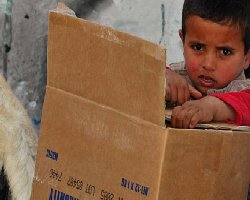A majority of Palestinians in East Jerusalem, including three out of four children, live in poverty, an Israeli rights group has said.
In a report released on Monday, the Association for Civil Rights in Israel (Acri) accused Israel of neglect and discrimination in its policies.
Despite the conditions, only 10 per cent of East Jerusalem's 300,000 Palestinians have access to social services to help remedy the situation, the organization said.
"A unified Jerusalem does not exist," the Israeli group said. "The truth is, two cities exist side by side."
Only 19 per cent of social worker positions in Jerusalem serve the Palestinians, who make up a third of the city's residents, and generally are in a much worse socio-economic state, Acri said.
The group published figures showing that 65 per cent of Palestinian families in East Jerusalem exist below the poverty line, as opposed to 31 per cent of the city's Jewish families.
Seventy-five per cent of Palestinian children in East Jerusalem live in poverty, compared with 45 per cent of the city's Jewish children, the group reported.
"Over 95,000 children in East Jerusalem live in a perpetual state of poverty," Acri said.
The office of Nir Barkat, the Israeli mayor of Jerusalem, told the AFP news agency that it had no immediate comment on Monday's report.
Limited services
The definition of the "poverty line" used in the report was the same as that used by the Israeli Centre for Statistics, set at 50 per cent of the median available household income.
The poverty line in 2007 was a monthly income of $770 for a family of two and $1,400 for a family of five.
Acri said Palestinians faced discrimination in almost all sectors of life.
"Israel's policy for the past four decades has taken concrete form as discrimination in planning and construction, expropriation of land, and minimal investment in physical infrastructure and government and municipal services," the report said.
Ziad Al-Hammouri, the director of the Jerusalem Centre for Social and Economic Rights, said that the situation for Palestinians in Jerusalem is getting worse "on a daily basis".
"It's different to even compare East and West Jerusalem," he told Al Jazeera.
"Just look at the streets. In East Jerusalem, there are not even pavements.
"Economical pressure is just one of the elements used by Israelis to succeed in their plans - to get the Palestinians to leave Jerusalem and to replace them with settlers."
Water shortage
About 160,000 Palestinian residents have no suitable and legal connection to the water network and 50km of main sewage lines are lacking, Acri said.
The annual budget allocation per elementary school child in East Jerusalem was $152 compared with $627 in the west of the city.
Acri also said there is a shortage of about 1,000 classrooms in East Jerusalem.
Israel has expropriated more than one-third of East Jerusalem land which was privately owned by Palestinians, on which it has built more than 50,000 homes for the Jewish population.
Virtually no permits for Palestinian housing construction have been issued for decades.
At the end of 2009, approximately 303,400 Palestinians lived in East Jerusalem, which equals 36 per cent of the city's total population of about 835,500.
The Acri report was to be published ahead of Israel's celebrations to mark the 43rd anniversary of its capture of East Jerusalem.
Israel seized and occupied the West Bank, including East Jerusalem, in 1967.
The move was met with international condemnation and the United Nations immediately declared Israel's occupation as illegal under international law.
PHOTO CAPTION
Israeli soldiers, left, stand guard as Palestinians protest against the construction of Israel's separation barrier in the West Bank town of Beit Jala, near Bethlehem, Sunday, May 9, 2010.
Source: Al-Jazeera


 Home
Home Discover Islam
Discover Islam Quran Recitations
Quran Recitations Lectures
Lectures
 Fatwa
Fatwa Articles
Articles Fiqh
Fiqh E-Books
E-Books Boys & Girls
Boys & Girls  Ramadan
Ramadan Fatwa Audios
Fatwa Audios Month of Mercy
Month of Mercy Women
Women Eed Al- Fitr
Eed Al- Fitr Food Recipes
Food Recipes Videos
Videos

 Prayer Times
Prayer Times












